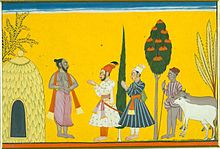Vasishtha
Vasishtha ( Sanskrit वसिष्ठ vasiṣṭha m. "The wealthiest") is one of the seven sages ( saptarishi ) in Hinduism . There are innumerable stories of Vasishtha in the classical Indian scriptures, which often contradict one another. Like the other seven wise men, he forms one of the seven stars of the Great Bear .
myth
In the 7th mandala of the Rigveda , whose author Vasishtha is given, the myth of Vasishtha's second birth is told. Thereafter, Vasishtha was an advisor to King Ikshvaku . His son Nimi cursed the wise man that he should lose his body, which he did. Vasishtha was incarnated again after the sperm of the two gods Mitra and Varuna dripped into a jug when they saw the Apsaras Urvashi . From this came Vasishtha and his brother Agastya .
Vasishtha married Arundhati, who exceeded the other women through her loyalty to her husband and through her asceticism and was therefore the only woman of the seven wise men to lose her mind, as the rider in the Great Bear, while Vasishta is seen in Mizar . Otherwise, the assignment of the seven stars in the Great Bear to the seven wise men is not given uniformly.
Vasishtha, along with Vishvamitra, was an advisor to the court of King Suda , who preferred the Vasishtha, which aroused the envy of Vishvamitra. The Indian epic Mahabharata tells how Vishvamitra induced the king's son Kalmashapada to kill the hundred sons of Vasishtha. This was also in possession of the desired cow Nandini , which Vishvamitra tried unsuccessfully to bring into his power. However, the legends about the two rivals are passed down quite differently.
According to the South Indian tradition, Vasishtha's asceticism consists in remaining in the yoga posture of the tree (vrikshasana) and constantly screaming.
See also
literature
- Hans Wilhelm Haussig (Ed.): Gods and Myths of the Indian Subcontinent (= Dictionary of Mythology . Department 1: The ancient civilized peoples. Volume 5). Klett-Cotta, Stuttgart 1984, ISBN 3-12-909850-X .
- Vasishtha . In: John Dowson : A classical dictionary of Hindu mythology and religion, geography, history, and literature. Trübner & co., London 1879, pp. 339-342 ( Textarchiv - Internet Archive ).
- Vasishtha . In: Wilfried Huchzermeyer : Studies in the Mahabharata. Indian Culture, Dharma and Spirituality in the Great Epic. Karlsruhe 2018, ISBN 978-3-931172-32-9 , pp. 134-141
Individual evidence
- ↑ vasiṣṭha . In: Monier Monier-Williams : Sanskrit-English Dictionary . Clarendon Press, Oxford 1899, p 930, column 2. - 930, Sp third .
